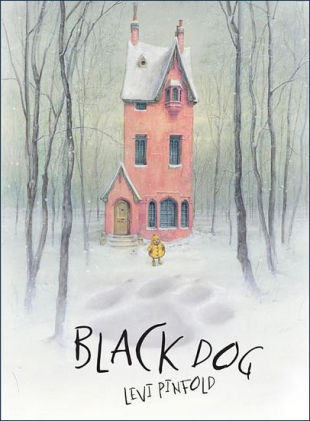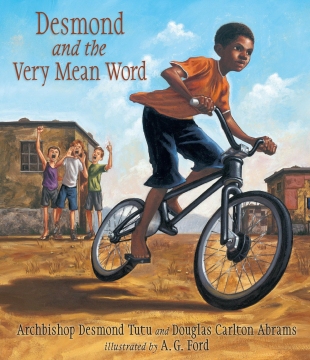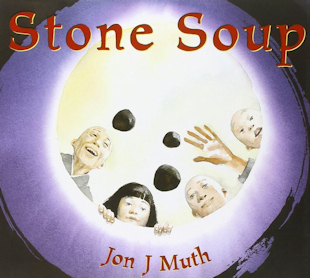Black Dog
By Levi Pinfold
For various members of the large Hope family, a big black dog they see out the window is scary. Describing it as being as big as a tiger, an elephant, a Tyrannosaurus rex, and other huge animals, they turn off the lights and hide. Then Small Hope, the youngest member of the family, decides to go outside and see what this enemy is really like. Everyone is apprehensive about her having her head munched and her bones crunched. But Small Hope confronts the big black dog and dares it to follow her under the bridge, over the ice, and through the playground. During this journey, he gets smaller until he's able to enter the Hope house through the cat flap. (Ages 4 and up.)
#2
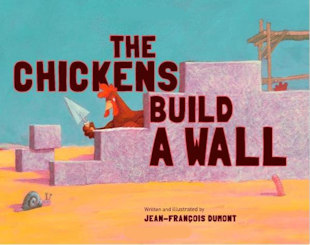
The Chickens Build a Wall
By Jean-Francois Dumont
A hedgehog with sharp quills shows up in the barnyard one day and nobody knows how he got there. The chickens, ducks, and geese are suspicious of this stranger. Fears turns to rumors about fewer worms to find and the possibility of missing chicks or eggs. So the community decides to build a wall around the henhouse so that no wild animals and potential enemies will be able to get inside of it. After completing the task, they are in for a big surprise that shocks them into a more loving and sane answer to their fears. (Ages 4 - 8)
Desmond and the Very Mean Word
By Desmond Tutu, Douglas Carlton Abrams
This spiritually animated story— a 2013 S&P award winner — is based on a real-life experience in South African Archbishop Desmond Tutu' s own childhood. Just after receiving a new bicycle, young Desmond goes for a ride and encounters a group of white boys who shout a very mean word at him. Upset and angry he stops by for a visit with Father Trevor who listens to his account of what happened. He tells Desmond that if he gives in to hatred and revenge, nothing will change and the cycle of hatred will go on forever. Forgiveness is a better path. "When you forgive someone, you free yourself from what they have said and done." (Ages 6 – 10)
#4
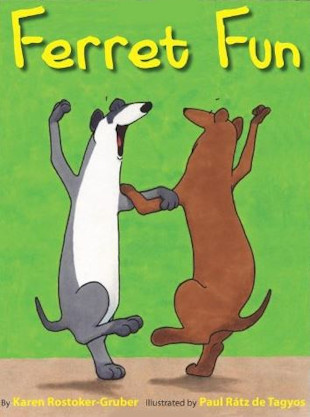
Ferret Fun
By Karen Rostoker-Gruber
Fudge and Einstein are two ferrets living in comfort in their cage when the lady of the house introduces them to Marvel, the cat. The cat thinks the ferrets are rats and zeroes in on ways to get to them. They are unable to convince the cat who they really are. After a standoff in which they order Marvel to stop bullying them, the ferrets come up with another plan. They will disarm the cat's yearning to eat them with something equally appealing: they will all play together. (Ages 4 - 8)
#5
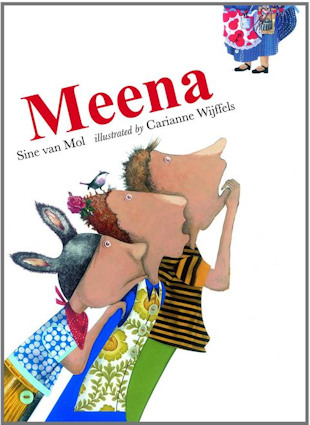
Meena
By Sine van Mol
Every community seems to have someone who appears strange and maybe even dangerous. In this book, rumors have spread among the children who live on Fly Street that Meena is a witch. Christa, Klaas, and Thomas have let their imaginations run wild and are under their own spell of fear. When they see a young girl in the house, they are convinced that the witch has taken a prisoner. The girl, Anna, turns out to be visiting her grandmother Meena. This charming tale teaches when we relent from accusations, gossip, and hatred which, of course, have no basis in reality, we can build relationships and understanding. (Ages 5 and up)
#6
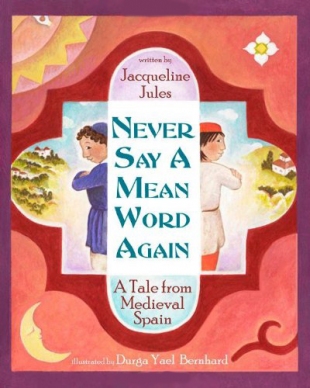
Never Say a Mean Word Again: A Tale from Medieval Spain
By Jacqueline Jules
This book is based on a story from the life of the Jewish poet Samuel Ha-Nagid (993-1056). In the opening scene, Samuel, a Jewish boy and son of the grand royal advisor, bumps into Hamza, a Muslim whose father is a tax collector. At the castle banquet, the two boys are seated next to each other. Again, Samuel's clumsiness causes trouble; this time he spills food on the Muslim boy's white tunic. Hamza calls him a stupid donkey brain. The two boys appear to be enemies with Samuel wanting to make sure Hamza never says a mean thing to him again. He imagines several possible scenarios including ones in which he restrains or humiliates his enemy. Instead, the two boys find out they have some things in common and build a friendship. (Ages 4-8)
Stone Soup
By Jon J. Muth
Gifted writer and illustrator Jon Muth has adapted the European folk tale, “Stone Soup,” and set it in China. Zen monks Hok, Lok, and Siew arrive in a closed-off village that has seen too many hard times with famine, floods, and war. Unhappiness has hardened the villagers' hearts. Lacking in trust, they are not kind to strangers. So the outsiders decide to make soup starting with some stones. A little girl comes outside and asks them if they need a bigger pot; her mother brings it to the monks. Others in the village begin to share the little they have. Afterwards, when the soup is done the whole community sits down to eat together the meal they have prepared – welcoming the strangers as friends.
